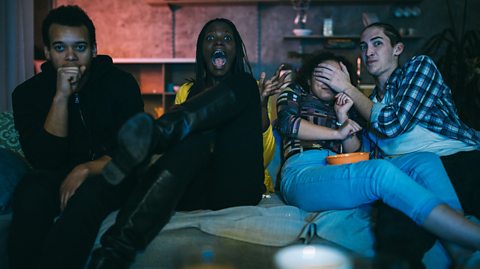Kindness is great to give, and especially nice to receive. But isn't something you can see, or touch. Nor does it have a smell, a noise or a flavour. So how can science research it?
There is a way, and it's concerned with how our brains are behaving when we're doing a good deed for someone else - behaviour that can be recorded and analysed. ґуПуґ«ГЅ Bitesize spoke to three scientists who (very kindly) gave up their time to explain what happens in our heads when we do our bit for other people.
Our brain loves us when we're kind
Have you ever done a selfless act for someone and felt great about it afterwards? That's because part of your brain called the nucleus accumbens is rewarding you by releasing chemicals which make you feel good. It's part of something called the reward pathway.
Dr Dan Campbell-Meiklejohn, a senior psychology lecturer at the University of Sussex described that reaction as: “At the moment when you help someone, you donate to charity, etc, the processes that happen in your brain are quite similar to other positive experiences. It activates the reward processing areas of the brain, so giving is a kind of reward. It lights up the same part of the brain as eating a nice slice of cake.”

Dopamine is one of these chemicals. It acts as a messenger in the brain to let us know that what we did was good behaviour and makes us want to repeat it. Another is oxytocin, which helps us form bonds and trust with people. if you've ever felt a rush of contentment about being around people you have a strong connection with, that's oxytocin being released.
The other chemical is serotonin. This is a hormone, linked to regulating our moods, giving us a balanced sleep pattern, less anxiety and more happiness.
Our eyes can react to people who are distressed
Can you remember a time when a friend, relative - or maybe even someone you don't know - has looked sad and you have felt sad for them in response? That's an example of empathy, where you are able to understand and share the feelings of another person. It's an important part of showing concern for others and offering kindness when it's needed.
We each have different levels of empathy and Professor Sarah Garfinkel, a neuroscientist based at the University of Sussex, explained how one experiment was used to measure this across a range of different people.
She said: “When you are sad, you will have physiological examples of sadness in your body. Your pupils will get small and then, when I look at you - if I am someone with high empathy, I will adopt the physiological signals of sadness in my own body. My pupils will get smaller also.”
In the experiment, people with higher levels of empathy were found to react to the sad, small pupils in strangers’ eyes while people with lower empathy levels were found not to react at all.
There is a part of our brain where we learn to be generous
The brain rewards us for being kind - in the nucleus accumbens - but there is another part where we can learn to be good to others.
Dr Patricia Lockwood is from the University of Birmingham’s School of Psychology. In 2016, she led a study at University of Oxford that uncovered a part of the brain which lights up when we help others, compared to when we help ourselves.
In the experiment, volunteers made use of a series of symbols. One symbol rewarded them, while another only benefited others. The part of the brain that activated when people deliberately chose to help others is called the subgenual anterior cingulate cortex. When the study was published, it became known as the 'generosity centre'.

Dr Lockwood said: “Put another way, the subgenual anterior cingulate seems to be especially tuned to benefiting other people."
Similar to the study involving the size of volunteers' pupils, empathy played a part in this experiment too - particularly the speed with which people started to help others selflessly.
Dr Lockwood continued: “This region of the brain was not equally active in every person. People who rated themselves as having higher levels of empathy learnt to benefit others faster than those who reported having lower levels of empathy.”
A good scare can affect your heart, breathing and even your eyes

The teenage brain: How can neuroscience help us understand teenagers?
How might a better understanding of the teenage brain help teenagers, and those around them?

The psychology behind a bargain
What happens in our brain when we spot that perfect deal.
